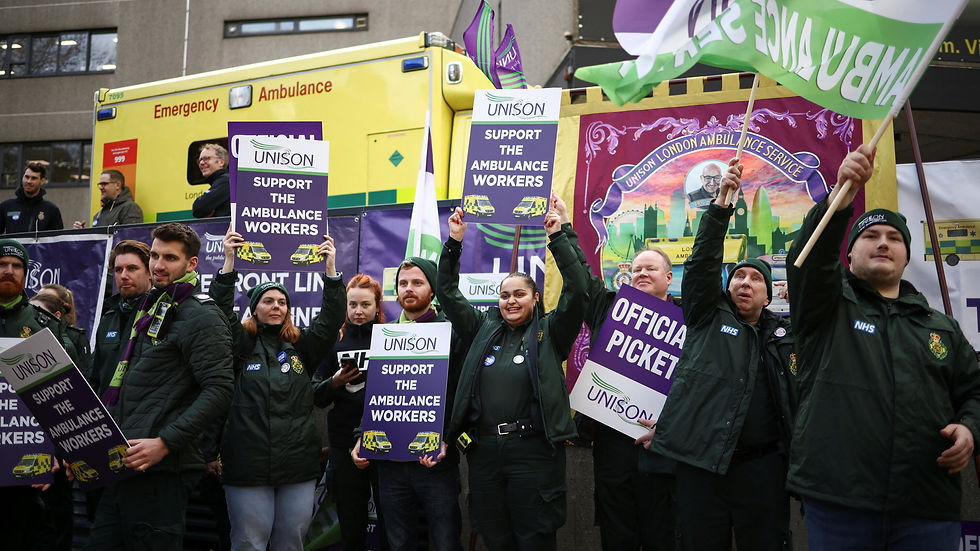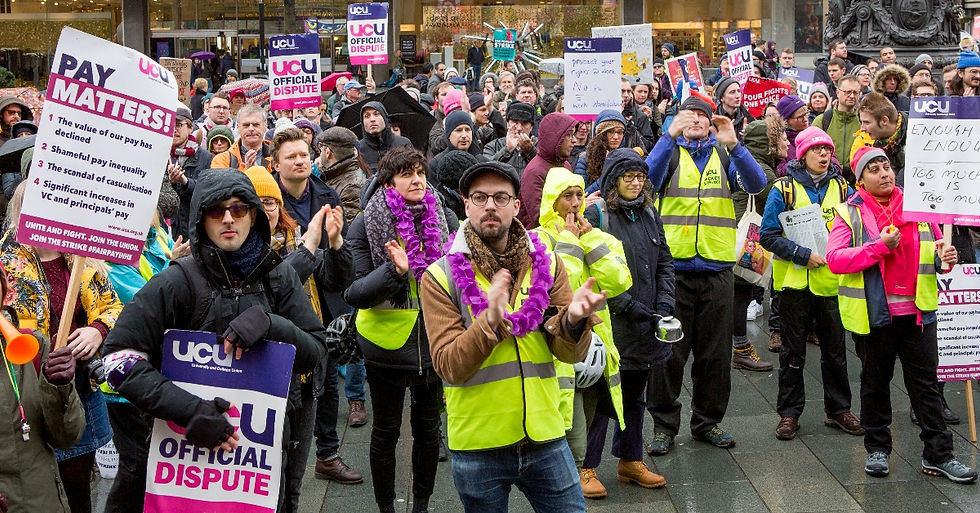Strikes Continue to Affect Whole of UK
- Kai Torrie

- Dec 22, 2022
- 4 min read
On Tuesday the 20th of December, 8 out of the 10 ambulance services in the UK announced that they were facing a critical incident. On the 21st of December, thousands of ambulance workers from across England and Wales took to the picket lines, striking for better pay. Among those partaking in the coordinated strike action are paramedics and 999 call handlers, representing the biggest ambulance strike in 30 years.

This follows the government’s announcement of a 4% pay rise for ambulance staff: an increase that many have deemed insufficient amid soaring inflation, which recently reached a 41-year-high of 11.1%. All three unions representing ambulance staff - GMB, Unison, and Unite - voted in favour of strike action, with 10 out of 11 of the ambulance trusts in England and Wales walking out today. Members of these unions at 9 of the 11 trusts will also strike on December 28th, with timings varying between each union and ambulance service - some of which will be on strike for a full 24 hours. Ambulance staff in five areas of England are to stage two further strikes in January.
NHS sources have warned that elderly patients who fall at home may face being left without an ambulance as they may not be included in the ‘life and limb’ cover that will be provided in life-threatening situations during the strikes. The president of the Royal College of Emergency Medicine also warned that the strikes could result in severely ill patients having to make their own way to A&E.
These announcements come as the country braces itself for at least a month of strike action. On December 20th, up to 100,000 nurses staged a second walkout, following their strike on December 15th.
As well as this, railway staff, Royal Mail employees, and civil servants will be taking industrial action amid ongoing rows over pay and work conditions, threatening to bring the country to a standstill this week. Further unrest could soon unfold, as strike ballots for firefighters and teachers close in January, with junior doctors scheduled to vote on strikes next month, while underground workers have approved a mandate for another six months of industrial action. The RMT says that its workers make an average salary of £31,000 per annum, which, in some cases, has not been increased for up to three years, demonstrating that wages are no longer increasing in proportion to the cost of living.
More than 115,000 postal workers walked out last Friday, with more strikes to come over the Christmas period. Shoppers have consequently resorted to using other delivery services like Evri, which has been inundated with parcels, in order to receive their deliveries in time for Christmas. Postal workers are striking for a pay increase to match inflation rates; their pay currently ranges from £6.82 to £17.89 per hour, depending on job title and experience.
In addition to this, the rail strikes have led to busier roads as some people are struggling to get home from work and university to spend Christmas with their families, increasing the amount of road traffic, and leading to standstills on the motorway.
Earlier this month, prime minister Rishi Sunak vowed that he would bring in ‘new tough laws’ to limit strike action, yet Number 10 is yet to release any details about these plans. Sharon Graham, the general secretary of Unite, has warned that employees will not be ‘intimidated by anti-trade union attacks’ and are ‘ready industrially and financially’ to challenge any new anti-strike measures. Strikes will continue to impact the UK up until the 10th of January 2023, at the very latest.
University staff also took strike action earlier this year, with demands for better pay, working conditions and pensions. This was deemed to be the biggest strike in the history of higher education. A majority of UCU members voted ‘yes’ to striking in last month’s historic ballots, calling for reforms to pay, working conditions, and pension cuts. According to the University and College Union, ‘The results are the first ever successful nationally aggregated ballots in the education sector since the Tories introduced anti-trade union laws in 2016. Despite the results, vice-chancellors have not made any improved offers.’

The University and College Union is calling for a significant pay rise to alleviate the burden of the ever-increasing cost of living crisis, while demanding an end to ‘insecure contracts’ and better measures to tackle ‘dangerously high workloads’. A recent pay rise for university staff of 3% has been deemed inadequate after - what the UCU described as - ‘at least a decade of below inflation pay awards’. Research has shown that university staff do two days of unpaid, additional work every week, while a third of academic staff operate on some type of temporary contract.
This year, amid a row about pensions, a package of cuts was introduced which saw the average UCU member lose 35% of their guaranteed future retirement income. For those in the early stages of their career, these losses could be worth hundreds of thousands of pounds. UCU general secretary Jo Grady said: ‘[University staff] have had enough of failing pay, pension cuts and gig-economy working conditions - all whilst vice chancellors enjoy lottery win salaries and live it up in their grace and favour mansions’.

_edited.png)

Comments